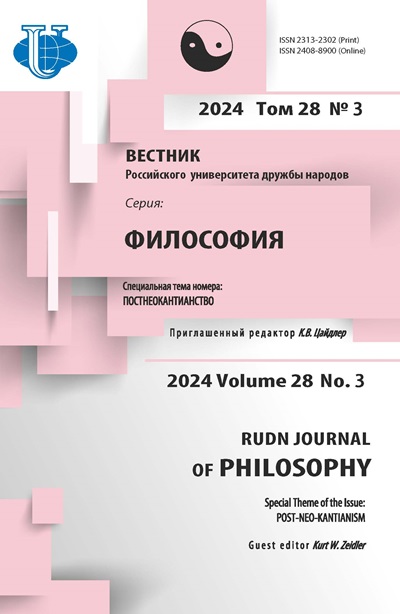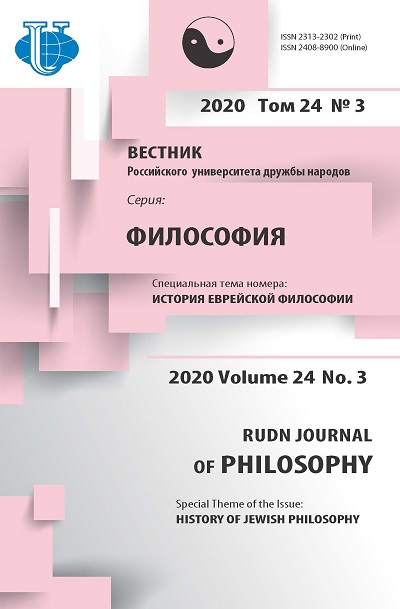Interdisciplinary Research of Self-Consciousness on the Base of Phenomenology of Karl Jaspers
- Authors: Strelnik O.N.1, Strelnik S.N.2
-
Affiliations:
- RUDN University
- Samara State Medical University
- Issue: Vol 24, No 3 (2020): HISTORY OF JEWISH PHILOSOPHY
- Pages: 410-418
- Section: PHILOSOPHY OF LIFE AND EXISTENTIAL PHILOSOPHY
- URL: https://journals.rudn.ru/philosophy/article/view/24354
- DOI: https://doi.org/10.22363/2313-2302-2020-24-3-410-418
Cite item
Full Text
Abstract
The objective of analysis is new opportunities in the study of self-awareness, which became possible through the use of an interdisciplinary approach. This approach allows to solve number of conceptual and methodological problems in psychology and psychiatry. The general development of psychiatry in the 20th and early 21st centuries was to improve diagnosis and therapy based on objectively measured indicators. There is a very superficial development of the phenomenology of self-awareness disorders as a result. The interdisciplinary point of view may be the beginning of new theoretical studies of self-awareness in philosophy, as well as provoke pragmatic conclusions for psychological and psychiatric science. Authors claim that the delimitation of the methodological tools of various sciences in the study of self-awareness is unnecessary in principle. interdisciplinary view should be formed by philosophers. The phenomenology of Karl Jaspers and his concept of self-awareness in this sense are heuristically attractive. The authors propose a working model of self-awareness, based on the phenomenological approach of Jaspers, on the ideas of his followers, and also abandoning the disciplinary view of the subject. In this model self-awareness is described through its specific functions. That may be pragmatically useful for mental health professionals: psychiatrists, psychologists and psychotherapists and it may be interesting to philosophers using phenomenological analysis.
About the authors
Olga N. Strelnik
RUDN University
Author for correspondence.
Email: ostrelnik@mail.ru
CSc in Philosophy, Associate Professor at the Department of ontology and theory of knowledge
Miklukho-Maklay Str., 6, Moscow, Russian Federation, 117198Sergey N. Strelnik
Samara State Medical University
Email: sssam12@rambler.ru
Сandidate of Medical Sciences, Associate Professor at the Department of psychiatry, narcology, psychotherapy and clinical psychology
Chapaevskaya Str., 89, Samara, Russian Federation, 443099References
- Insel T, Cuthbert B, Garvey M, Heinssen R, Pine DS, Quinn K, Sanislow CA, Wang P. Research Domain Criteria: Developing a valid diagnostic framework for research on mental disorders. American Journal of Psychiatry. 2010; 167 (7): 748-751.
- Philippi C, Koenigs M. The neuropsychology of self-reflection in psychiatric illness. Journal of psychiatric research. 2014 Mar.: 55-63.
- Broome MR, Harland R, Owen GS, Stringaris A. The Maudsley Reader in Phenomenological Psychiatry. New York: Cambridge University Press; 2012.
- Goldberg D. Karl Jaspers, general psychopathology-reflection. Br J Psychiatry. 2013; 202: 83.
- Musalek M. Karl Jaspers and human-based psychiatry-reflection. Br J Psychiatry. 2013;202: 306.
- Sims A. Karl Jaspers-reflection. Br J Psychiatry. 2013; 202: 4.
- Jaspers K. General psychopathology. Moscow: Practice; 1997. (In Russian).
- Jaspers K. Philosophical Autobiography. In: Western philosophy: results of the Millennium. Bishkek. Odyssey; 1997. (In Russian).
- Vlasova OA. Phenomenology of Karl Jaspers: histology and roentgenoscopy of the soul. Questions of philosophy. 2013; (2): 89-100. (In Russian).
- Strelnik SN. Psychopathology of self-consciousness: from phenomenology of K. Jaspers to postnonclassical psychiatry. Neurological Bulletin. 2018; (3): 55-62. (In Russian).
- Chudnovsky VS, Nosachev GN, Baranov VS, Lashmanova DM, Stegunina SI, Katricheva LV. Clinical aspect of self-consciousness in mental diseases in connection with the issues of diagnosis, treatment and rehabilitation. Kuibyshev. Publishing House of the Kuibyshev Medical Institute. DI. Ulyanova; 1982. (In Russian).
















